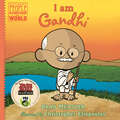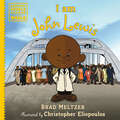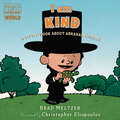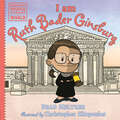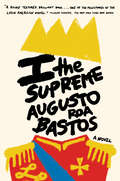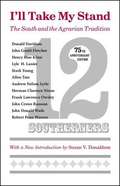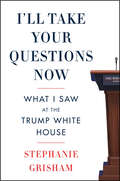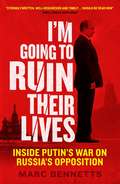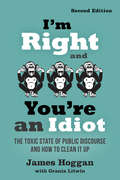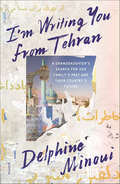- Table View
- List View
I am Gandhi (Ordinary People Change the World)
by Brad Meltzer Christopher EliopoulosAdvocate for peace and nonviolent revolutionary Gandhi is the 12th hero in the New York Times bestselling picture book biography series for ages 5 to 8. (Cover may vary) As a young man in India, Gandhi saw firsthand how people were treated unfairly. Refusing to accept injustice, he came up with a brilliant way to fight back through quiet, peaceful protest. He took his methods with him from South Africa back to India, where he led a nonviolent revolution that freed his country from British rule. Through his calm, steady heroism, Gandhi changed everything for India and inspired civil rights movements all over the world, proving that the smallest of us can be the most powerful. This friendly, fun biography series inspired the PBS Kids TV show Xavier Riddle and the Secret Museum. One great role model at a time, these books encourage kids to dream big. Included in each book are: • A timeline of key events in the hero&’s history • Photos that bring the story more fully to life • Comic-book-style illustrations that are irresistibly adorable • Childhood moments that influenced the hero • Facts that make great conversation-starters • A virtue this person embodies: Gandhi's commitment to peace is celebrated in this biography You&’ll want to collect each book in this dynamic, informative series!
I am George Washington (Ordinary People Change the World)
by Brad MeltzerChildren will want to read about our first president while discussing the presidential elections. This is the ninth book in the New York Times bestselling biography series that inspires while it informs and entertains. (Cover may vary) George Washington was never afraid to be the first to try something, from exploring the woods around his childhood home to founding a brand new nation, the United States of America. With his faith in the American people and tremendous bravery, he helped win the Revolutionary War and became the country&’s first president.This friendly, fun biography series inspired the PBS Kids TV show Xavier Riddle and the Secret Museum. One great role model at a time, these books encourage kids to dream big. Included in each book are: • A timeline of key events in the hero&’s history • Photos that bring the story more fully to life • Comic-book-style illustrations that are irresistibly adorable • Childhood moments that influenced the hero • Facts that make great conversation-starters • A virtue this person embodies: George Washington's courage to set off a new course is highlighted here. You&’ll want to collect each book in this dynamic, informative series!
I am John Lewis (Ordinary People Change the World)
by Brad MeltzerThe late Civil Rights activist and Congressman John Lewis is the 29th hero in the New York Times bestselling picture book biography series for ages 5 to 9. <P><P> This book spotlights John Lewis, known for his role in the Civil Rights Movement, having helped organize the March on Washington and the Selma Voting Rights March, and for his lifelong dedication to public service as a member of the House of Representatives. John Lewis was never afraid to get in good trouble. <P><P> This friendly, fun biography series inspired the PBS Kids TV show Xavier Riddle and the Secret Museum. One great role model at a time, these books encourage kids to dream big. <P><P><i>Advisory: Bookshare has learned that this book offers only partial accessibility. We have kept it in the collection because it is useful for some of our members. Benetech is actively working on projects to improve accessibility issues such as these.</i>
I am Kind: A Little Book About Abraham Lincoln (Ordinary People Change the World)
by Brad Meltzer Christopher EliopoulosThe littlest readers can learn about Abraham Lincoln in this board book version of the New York Times bestselling Ordinary People Change the World biography.This friendly, fun biography series focuses on the traits that made our heroes great--the traits that kids can aspire to in order to live heroically themselves. In this new board book format, the very youngest readers can learn about one of America's icons in the series's signature lively, conversational style. The short text focuses on drawing inspiration from these iconic heroes, and includes an interactive element and factual tidbits that young kids will be able to connect with. This volume tells the story of Abraham Lincoln, America's sixteenth president.
I am Ruth Bader Ginsburg (Ordinary People Change the World)
by Brad MeltzerSupreme Court Justice Ruth Bader Ginsburg is the 32nd hero in the New York Times bestselling picture book biography series for ages 5 to 9.Before Supreme Court Justice Ruth Bader Ginsburg was the judge, she was a young Jewish girl growing up in Brooklyn, inspired by books, past female trailblazers, and her mother to make the world a better, more just place to be. So even when people turned her away—for being a girl and for being Jewish—she never stopped fighting for equal treatment for everyone by pushing back against unjust laws and the beliefs around them. This friendly, fun biography series inspired the PBS Kids TV show Xavier Riddle and the Secret Museum. One great role model at a time, these books encourage kids to dream big.Included in each book are: A timeline of key events in the hero&’s history Photos that bring the story more fully to life Comic-book-style illustrations that are irresistibly adorableChildhood moments that influenced the hero Facts that make great conversation-starters A virtue this person embodies: Ruth Bader Ginsburg&’s perseverance to create justice and equality is highlighted. You&’ll want to collect each book in this dynamic, informative series!
I am Tim: Life, Politics and Beyond
by Peter Rees'My name is Tim, and that is what I want you to call me, except if another officer is present and especially if it is the CO, Lt Col Bennett, then I am Sir. At all other times I am Tim. When Tim Fischer's elder son was diagnosed with autism spectrum disorder, it triggered Tim's resignation as federal National Party leader and deputy prime minister of Australia. An outpouring of emotion across the political divide greeted his decision, a rarity in a political environment where few leaders choose to give up power and prominence. In I am Tim, Peter Rees uncovers the influences that shaped a key figure of twentieth-century Australian political life, from a Jesuit boarding school to the rigours of officer training and the battlefields of Vietnam, time in state and federal politics, marriage to Judy Brewer and life at home. Fischer's interests and activities after politics were many and varied, spanning a diplomatic posting to the Holy See, new historical studies, and chairing the Global Seed Vault in Svalbard, Norway. Tim Fischer emerges as a man of energy and ambition but also of humanity, courage and love.
I the Supreme (Latin American Literature Ser.)
by Augusto Roa BastosI the Supreme imagines a dialogue between the nineteenth-century Paraguayan dictator known as Dr. Francia and Policarpo Patiño, his secretary and only companion. The opening pages present a sign that they had found nailed to the wall of a cathedral, purportedly written by Dr. Francia himself and ordering the execution of all of his servants upon his death. This sign is quickly revealed to be a forgery, which takes leader and secretary into a larger discussion about the nature of truth: “In the light of what Your Eminence says, even the truth appears to be a lie.” Their conversation broadens into an epic journey of the mind, stretching across the colonial history of their nation, filled with surrealist imagery, labyrinthine turns, and footnotes supplied by a mysterious “compiler.” A towering achievement from a foundational author of modern Latin American literature, I the Supreme is a darkly comic, deeply moving meditation on power and its abuse—and on the role of language in making and unmaking whole worlds.
I'd Rather We Got Casinos: And Other Black Thoughts
by Larry WilmoreWithin these pages are the musings, the revelations, the ruminations, and the reflections of the incomparable Larry Wilmore. Here, collected for the first time, all in one place, are his Black Thoughts. From why black weathermen make him feel happy (or sad) and why brothas don't see UFOs to his search for Black Jesus or his quest to replace "African-American" with "chocolate," Wilmore has finally relented, agreeing to share his unique (black) perspective. Soon, you too will have the ability to find racism in everything. Bring back the Shetland Negro and do away with Black History Month! After all, can twenty-eight days of trivia really make up for centuries of oppression? In Wilmore's own words, "I'd rather we got casinos!"
I'll Be Short: Essentials for a Decent Working Society
by Robert B. ReichThe get-rich-quick exuberance of the late 1990s may have temporarily blinded people to how dependent they are on each other, muses Reich (economics, Brandeis U.). He points out the bonds on which rest the strength of the economy and the security of society. He wrote while running for governor of Massachusetts. The treatise has no index or bibliography. Annotation c. Book News, Inc., Portland, OR. (booknews.com)
I'll Burn That Bridge When I Get to It!: Heretical Thoughts on Identity Politics, Cancel Culture, and Academic Freedom
by Norman FinkelsteinNorman Finkelstein first made his name while still in graduate school when he exposed an acclaimed national bestseller as a hoax. He went on in subsequent decades to subject Israel's apologists as well as Holocaust hucksters to withering scrutiny. In his new book, Finkelstein focuses his keen forensic eye on the canonical texts of identity politics. After methodically parsing them, Finkelstein concludes that they're lacking in intellectual substance. Instead, the real purpose of identity politics is to derail a class-based-movement bent on radical change. In a long, scathing chapter, Finkelstein analyzes the cult surrounding Barack Obama, which he reveals as the ultimate product of identity politics. The first Black president rose to power by having, in Obama's own cynical words, "pulled off a neat trick" by standing for nothing except his skin color. If '"woke" liberals embraced him, it was because, beneath his hip veneer, Obama was a sure bet to prop up the corrupt status quo. Along the way, Finkelstein recalls his own life in radical politics and his close encounters with cancel culture, which left him unemployed and unemployable. He situates his personal story within broader debates on academic freedom and poignantly concludes that, although occasionally bitter, he harbors no regrets about the choices he made. "If I can't laugh, I don't want your revolution," Finkelstein declares. Readers of this book, laced with his signature wit, will get to laugh along with him.
I'll Find a Way or Make One: A Tribute to Historically Black Colleges and Universities
by Juan Williams Dwayne AshleyA comprehensive and definitive guide to America's 107 historically black colleges and universities, this commemorative gift book explores the historical, social, and cultural importance of the nation's HBCUs and celebrates their rich legacy.Included in this one-of-a-kind collection are:Detailed profiles of each HBCUIlluminating portraits of distinguished HBCU graduates such as Leontyne Price, Thurgood Marshall, Spike Lee, and Oprah WinfreyLittle-known anecdotes about pre-Civil War efforts to educate blacks, such as how a white pastor founded what became Lincoln University after his black protégé was excluded from Princeton's Theological SeminaryRare photographs and archival materials featuring the likes of Eleanor Roosevelt addressing students at Howard University Chronicling the history of education in the African American community, I'll Find a Way or Make One is not only an unprecedented salute to historically black colleges and universities, but also an indispensable account of some of the most important events of African Americana and American history.
I'll Take My Stand: The South and the Agrarian Tradition (Library of Southern Civilization)
by Robert Penn Warren Allen Tate Donald Davidson John Gould Fletcher John Crowe Ransom Susan V. Donaldson Henry Blue Kline Lyle H. Lanier Stark Young Andrew Nelson Lytle Herman Clarence Nixon Frank Lawrence Owsley John Donald WadeFirst published in 1930, the essays in this manifesto constitute one of the outstanding cultural documents in the history of the South. In it, twelve southerners-Donald Davidson, John Gould Fletcher, Henry Blue Kline, Lyle H. Lanier, Stark Young, Allen Tate, Andrew Nelson Lytle, Herman Clarence Nixon, Frank Lawrence Owsley, John Crowe Ransom, John Donald Wade, and Robert Penn Warren-defended individualism against the trend of baseless conformity in an increasingly mechanized and dehumanized society. In her new introduction, Susan V. Donaldson shows that the Southern Agrarians might have ultimately failed in their efforts to revive the South they saw as traditional, stable, and unified, but they nonetheless sparked debates and quarrels about history, literature, race, gender, and regional identity that are still being waged today over Confederate flags, monuments, slavery, and public memory.
I'll Take Your Questions Now: What I Saw at the Trump White House
by Stephanie GrishamThe most frank and intimate portrait of the Trump White House yetStephanie Grisham rose from being a junior press wrangler on the Trump campaign in 2016 to assuming top positions in the administration as White House press secretary and communications director, while at the same time acting as First Lady Melania Trump’s communications director and eventually chief of staff. Few members of the Trump inner circle served longer or were as close to the first family as Stephanie Grisham, and few had her unique insight into the turbulent four years of the administration, especially the personalities behind the headlines.
I'm Back for More Cash: A Tony Kornheiser Collection (Because You Can't Take Two Hundred Newspapers into the Bathroom)
by Tony KornheiserI think it's really cool to be on a jury. Take the O.J. jury--the people on that jury got book deals, and they got on Nightline, and some of them even got to meet Greta Van Susteren! They were always being written about in the newspapers: "Juror No. 1, a thirty-six-year-old Caucasian male with a master's degree who works for a high-tech corporation." Throw in a line about how "he likes to hunt and fish," and you've got The Dating Game.I wonder what they'd write about me. "Juror No. 4, a fat, bald, old, whiny Caucasian man who dresses like a vagrant and has complained incessantly about the texture of the toilet paper in the jury lavatory." I try to diet, but unfortunately I've come to the point in life where nearly everything disgusts or disappoints me except food. And so I eat all day long. If I had a family crest, at this point it would be a man with a chicken breast in one hand, a cheeseburger in the other, and a garland of sour-cream-and-onion potato chips around his head. Tony Kornheiser is back. The celebrated Washington Post columnist and ESPN radio and TV personality relates his experience as an OnStar user, a proud new owner of the Ronco Showtime Rotisserie & BBQ, and a "phone-a-friend" on Who Wants to Be a Millionaire. And in between, he dishes out political commentary on Monica and Bill and Al and George W. Read all about his quest to fit into size 36 Dockers and his struggle to buy holiday gifts. And know that in the process you're handing this Kornheiser guy the dough for these columns twice. I got into the stock market late. I was deep in my forties and I still had all my money in the bank, earning 2 percent, like it was low-fat milk. My friends laughed at me. Even the people at the bank laughed at me--they had all their money in the market. So I gave my money to a financial adviser, who promised me he would get me a greater return than the bank. A baboon could do that, Tony. Yes, but would a baboon give me steak knives?--from I'm Back for More Cash.
I'm Dying Laughing: The Humourist (Penguin Twentieth Century Classics Ser.)
by Christina SteadChristina Stead's unforgettable final novel--a profound examination of love and radicalism during the McCarthy eraIn the wake of the Great Depression, Emily Wilkes, a young American journalist, travels to a Europe still scarred by World War I. During her crossing, she meets Stephen Howard, a charismatic and wealthy Communist who quickly converts Emily to his ideals when the two become lovers. Upon their return to the States, they marry and settle into a comfortable life in Hollywood as darlings of the American left. Emily shines as a screenwriter and novelist while Stephen dedicates himself to the Party line--but their radicalism soon finds them out of favor and retreating to Paris, where they tragically and bitterly unravel. Published posthumously by Christina Stead's literary executor professor Ron Geering, I'm Dying Laughing is an unflinching look at political faith and romantic attachment.
I'm Going to Ruin Their Lives: Inside Putin's War on Russia's Opposition
by Marc BennettsVladimir Putin's return to the Russian presidency amid mass protests in 2012 ushered in a ruthless crackdown on dissent. 'They ruined my big day, now I'm going to ruin their lives,' Putin was alleged to have threatened after demonstrators clashed with police on the eve of his inauguration for a controversial third term. Now Boris Nemtsov is dead, other key opposition leaders are either in prison or under house arrest and the Kremlin is using the war in Ukraine to further its domestic aims, encouraging the rise of violent pro-Putin groups and labeling protesters 'national traitors'.Journalist and long-time Moscow resident Marc Bennetts examines how Russia's political opposition went from the heights of 2011's brave new protest movement to the disparate, broken-down force that it is today. Featuring rare interviews with everyone from Nemtsov and other protest leaders to Kremlin insiders, Bennetts provides an unprecedented insight into the realities of Russia's political arena. The result is a brilliant portrayal of the battle for Russia's soul, one which continues to this day.
I'm Right and You're an Idiot: The Toxic State of Public Discourse and How to Clean it Up
by James Hoggan Grania Litwin&“Explor[es] the underlying history and psychology of public discourse . . . should be required reading for politicians and public advocates.&” —Real Change The most pressing problem we face today is not climate change. It is pollution in the public square, where a toxic smog of adversarial rhetoric, propaganda, and polarization stifles discussion and debate, creating resistance to change and thwarting our ability to solve our collective problems. In this second edition of I&’m Right and You&’re an Idiot, James Hoggan grapples with this critical issue, through interviews with outstanding thinkers and drawing on wisdom from highly regarded public figures. Featuring a new, radically revised prologue, afterword, and a new chapter addressing the changes in the public discourse since the 2016 US election, his comprehensive analysis explores: · How political will is manipulated · How tribalism shuts down open-minded thinking, undermines trust, and helps misinformation thrive · Why facts alone fail and how language is manipulated and dissent silenced · The importance of dialogue, empathy, and pluralistic narrative reframing arguments to create compelling narratives and spur action. Our species&’ greatest survival strategy has always been foresight and the ability to leverage intelligence to overcome adversity. For too long now this capacity has been threatened by the sorry state of public discourse. Focusing on proven techniques to foster more powerful and effective communication, I&’m Right and You&’re an Idiot will appeal to readers looking for deep insights and practical advice in these troubling times. &“This is a must-read for anyone tired of the bullying, the propagandizing, the screaming, and the bullsh*t.&” —Dr. Samantha Nutt, author of Damned Nations: Greed, Guns, Armies and Aid
I'm Right and Youre an Idiot: The Toxic State of Public Discourse and How to Clean it Up
by James HogganThe most pressing environmental problem we face today is not climate change. It is pollution in the public square, where a smog of adversarial rhetoric, propaganda, and polarization stifles discussion and debate, creating resistance to change and thwarting our ability to solve our collective problems.In I'm Right and You're an Idiot, author and David Suzuki Foundation chair James Hoggan grapples with this critical issue, conducting interviews with outstanding thinkers from the Himalayas to the House of Lords. Drawing on the wisdom of such notables as Thich Nhat Hanh, Noam Chomsky, and the Dalai Lama, his comprehensive analysis explores: How trust is undermined and misinformation thrives in today's public dialogue Why facts alone fail - the manipulation of language and the silencing of dissent The importance of reframing our arguments with empathy and values to create compelling narratives and spur action. Our species' greatest survival strategy has always been foresight and the ability to leverage our intelligence to overcome adversity. For too long now this capacity has been threatened by the sorry state of our public discourse. Focusing on proven techniques to foster more powerful and effective communication, this book will appeal to readers looking for both deep insights and practical advice.James Hoggan is president of the Vancouver PR firm Hoggan & Associates, chair of the David Suzuki Foundation board, and founder of the influential website DeSmogBlog. He is author of Climate Cover-Up and Do the Right Thing.
I'm Speaking: Words of Strength and Wisdom from Vice President Kamala Harris
by Mary ZaiaKamala Harris wants your voice to be heard. I'm Speaking is a collection of the empowering words of a trailblazing Vice President who believes we can reach a better, stronger tomorrow together. She is no stranger to being the “first” to take action and break into new leadership roles, and her guidance, resolve, and strength of character affirm the promise that she will not be the last. This book of quotations is not just a source of her wisdom, but a beacon of compassion, encouragement, and the assurance that the future is for everyone. I’m Speaking is a hopeful reminder that unity is not found by following the loudest voice, but by emboldening us all to speak up and speak out until everyone’s voice is heard.· Pore over nearly 150 moving quotes on integrity, leadership, and empathy· Look to Kamala Harris for power, poise, and limitless aspirations for a better world · Celebrate a brighter future with the first Black, Asian-American, female Vice President
I'm Staying Here: A Novel
by Marco BalzanoA mother recounts her life story to her long-lost daughter in this sweeping historical novel about a community torn between Italian fascism and German Nazism. In the small village of Curon in South Tyrol, seventeen-year-old Trina longs for a different life. She dedicates herself to becoming a teacher, but the year that she qualifies—1923—Mussolini&’s regime abolishes the use of German as a teaching language in the annexed Austrian territory. Defying their ruthless program of forced Italianization, Trina works for a clandestine network of schools in the valley, always with the risk of capture. In spite of this new climate of fear and uncertainty, she finds love and some measure of stability with Erich, an orphaned young man and her father&’s helper. Now married and a mother, Trina&’s life is again thrown into uncertainty when Hitler&’s Germany announces the &“Great Option&” in 1939, and communities in South Tyrol are invited to join the Reich and leave Italy. The town splits, and ever-increasing rifts form among its people. Those who choose to stay, like Trina and her family, are seen as traitors and spies; they can no longer leave the house without suffering abuse. Then one day Trina comes home and finds that her daughter is missing… Inspired by the striking image of the belltower rising from Lake Resia, all that remains today of the village of Curon, Marco Balzano has written a poignant novel that beautifully interweaves great moments in history with the lives of everyday people.
I'm Writing You from Tehran: A Granddaughter's Search for Her Family's Past and Their Country's Future
by Delphine MinouiA lucid, moving view into an often obscured part of our world, exploring notions of democracy, identity, and the resilience of the human spiritIn the wake of losing her beloved grandfather, Delphine Minoui decided to visit Iran for the first time since the revolution. It was 1998. She was twenty-two and a freshly minted journalist. She would stay for ten years.Quickly absorbed into the everyday life of the city, Minoui attends secret dance parties that are raided by the morality police and dines in the home of a young couple active in the Basij—the fearsome militia. She befriends veteran journalists battling government censorship, imprisoned student poets, and her own grandmother (a woman who is discovering the world of international affairs through her contraband satellite TV).And so it is all the more crushing when the political situation falters. Minoui joins street protests teeming with students hungry for change and is interrogated by the secret police; she sees a mirrored rise in the love of country—the yearning patriotism of the left, the militant nationalism of the right. Friends disappear; others may be tracking her movements. She finds love, loses her press credentials, marries, and is separated from her husband by erupting global conflict. Through it all, her love for Iran and its people deepens. In her family’s past she discovers a mission that will shape her entire future.Framed as a letter to her grandfather and filled with disarming characters in momentous times, I’m Writing You from Tehran is a remarkable blend of global history, family memoir, and the making of a reporter, told by someone both insider and outsider—a child of the diaspora who is a world-class political journalist.
I'm Your Emotional Support Animal: Navigating Our All Woke, No Joke Culture
by Adam CarollaIn I’m Your Emotional Support Animal, Adam Carolla examines how our culture went careening off a cliff. We used to have one that created real warriors who fought world wars. Now it spawns social justice warriors who fight Twitter wars. He takes on those who are traumatized by Trump and “emotional support animal” owners who proclaim their victimhood at every airport. He stands up for the collateral damage of the #MeToo movement and for freedom of speech on “safe space” filled college campuses. Examining the calculated commercials churned out by Madison Avenue, like the ones about cars “made with love,” Carolla rants on ads designed to either bum us out or make us think the corporation is run by Mr. Rogers. Turning to social media, Adam takes down the “hashtag heroes” who signal their virtue daily from atop Twitter mountain. And in the era of the Roomba, performances by dead celebrity holograms, and meals-on-demand delivery services, he looks down the road at our not-so-bright future as a species.
I'm from Bouctouche, Me
by Donald J. SavoieIn the 1950s most of Acadian society was poor, uneducated, isolated, and dominated by the Roman Catholic clergy. In the following decade two individuals, Pierre E. Trudeau and Louis J. Robichaud, pointed the way for Acadians like Savoie to make important contributions to Canada's development. Trudeau's objective was Canadian unity and he turned to Acadie to show Quebec that there was a viable French Canadian presence outside their borders. Robichaud, New Brunswick's first elected Acadian premier, had witnessed Acadian poverty first hand and made it his mission to bring New Brunswick into the modern era. Savoie shows how their efforts led to fundamental change for both Canada and New Brunswick and changed his life.
I'm from Bouctouche, Me: Roots Matter (Footprints Series #28)
by Donald J. SavoieIn the 1950s most of Acadian society was poor, uneducated, isolated, and dominated by the Roman Catholic clergy. In the following decade two individuals, Pierre E. Trudeau and Louis J. Robichaud, pointed the way for Acadians like Savoie to make important contributions to Canada's development. Trudeau's objective was Canadian unity and he turned to Acadie to show Quebec that there was a viable French Canadian presence outside their borders. Robichaud, New Brunswick's first elected Acadian premier, had witnessed Acadian poverty first hand and made it his mission to bring New Brunswick into the modern era. Savoie shows how their efforts led to fundamental change for both Canada and New Brunswick and changed his life.
I'm from the Government and I'm Here to Kill You: The True Human Cost of Official Negligence
by David HardyGallup recently found that 49 percent of Americans believe that the government poses “an immediate threat to the rights and freedoms of ordinary citizens.” I’m from the Government and I’m Here to Kill You, written by a former federal attorney, shows that even the 49 percent have no idea how bad things really are. Rights and freedoms are not the only things at stake; all too often government imperils the very lives of those it supposedly serves. Federal employees have, with legal impunity, blown up a town and killed six hundred people, released staggering amounts of radioactive contamination and lied about the resulting cancer, allowed people to die of an easily treated disease in order to study their deaths, and run guns to Mexican drug cartels in hopes of expanding agency powers. Law enforcement leaders have ordered their subordinates to commit murder. Medical administrators have “cooked the books” and allowed patients to die, while raking in plump bonuses. Federal prosecutors have sent Americans to prison while concealing evidence that proved their innocence.I’m from the Government documents how we came to this pass: American courts misconstrued and expanded the old legal concept of sovereign immunity, “the king can do no wrong.” When Congress attempted to allow suits against the government, the legislators used vague language that the courts construed to block most lawsuits. The result is a legal system that allows official negligence to escape legal consequences and paradoxically punishes an agency if it tries to secure public safety. I’m from the Government ends with proposals for legal reforms that will hold the government and its servants accountable when they inflict harm on Americans.
